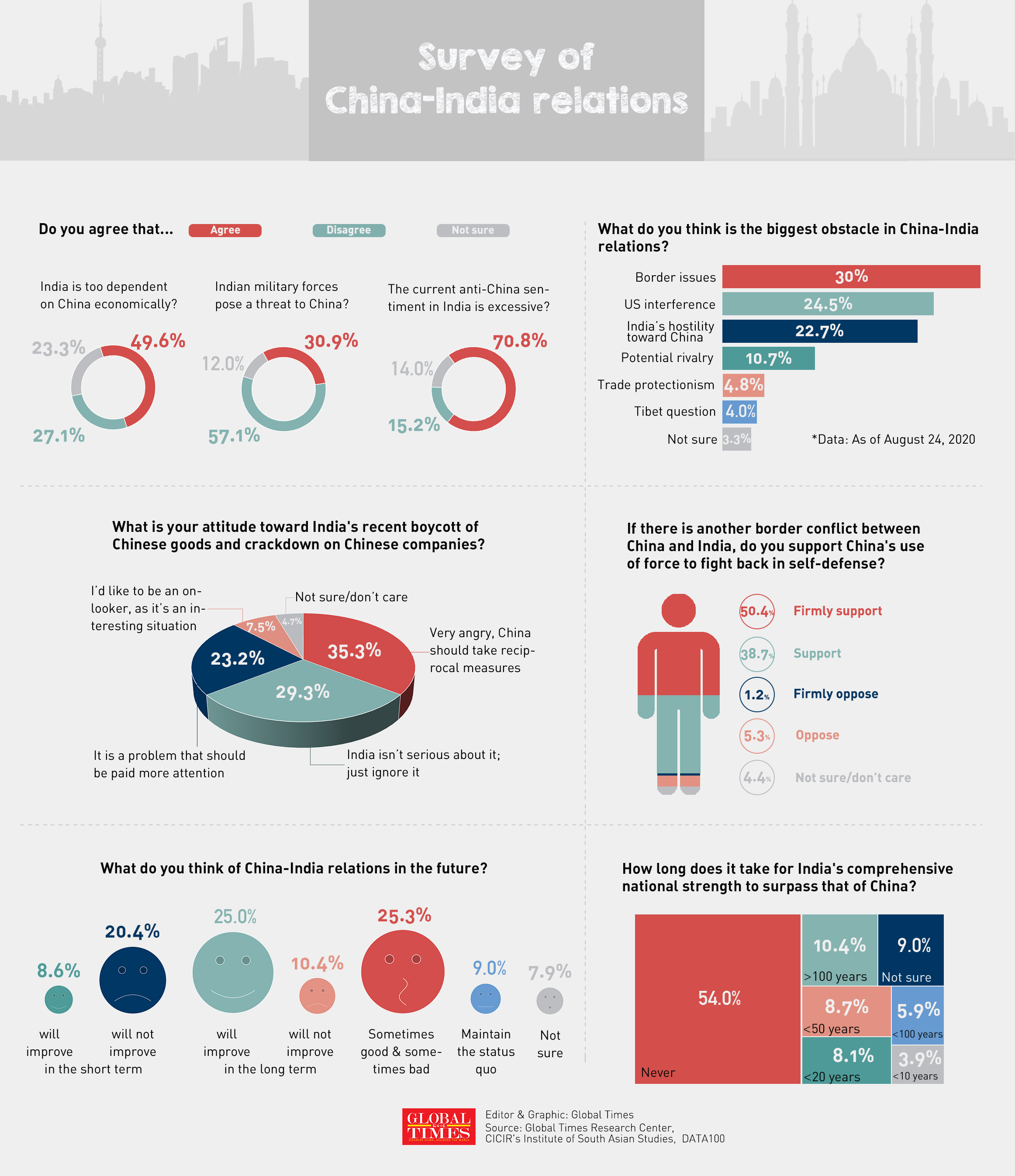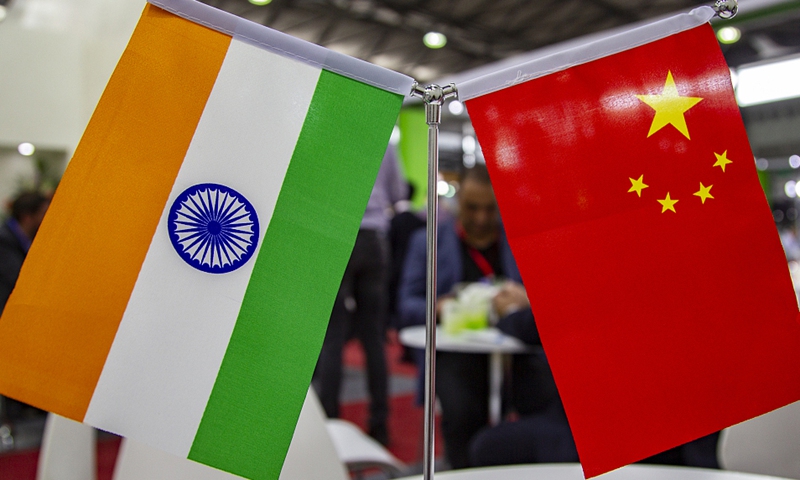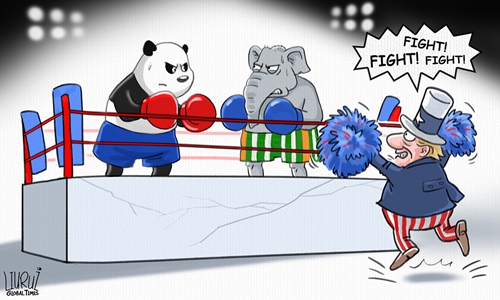India unable to threaten China militarily, economically: survey
By Yang Sheng, Chu Daye, Zhan Hui and Liu Caiyu Source: Global Times Published: 2020/8/27 13:21:09
Over 70 percent of participants support govt in retaliating strongly against Indian provocation
 Graphic: GT
Graphic: GTThe latest survey on China-India relations launched by the Global Times and China Institutes of Contemporary International Relations (CICIR) showed that more than 70 percent of participants believe that India is being too hostile against China and nearly 90 percent surveyed support the government in retaliating strongly against Indian provocations.
If India makes more provocations in the future and launches new border conflicts against China, about 90 percent of participants support China in defending itself and striking back at India with force, but some participants (26.4 percent) also see India as a neighbor and have a "favorable impression" of them, putting the country the fourth on the list of the "most favorable neighbors," following Russia (48.8 percent), Pakistan (35.1 percent) and Japan (26.6 percent).
The survey by the Global Times Research Center and Institute of South Asian Studies of the CICIR was conducted among 1,960 participants in China from August 17-20, executed by DATA 100, a market survey company, and covered 10 major cities across all regions of the country - Beijing, Shanghai, Guangzhou, Xi'an, Shenyang, Wuhan, Chengdu, Zhengzhou, Qingdao and Kunming.
Positive or negative?
Just over 56 percent of participants said they have a "clear understanding of India" and 16.3 percent of them said they are "very familiar" with the country, which slightly surprised some experts.
Hu Shisheng, director of the Institute of South Asian Studies at the CICIR, told the Global Times that the reason why more than half of the participants are confident in their understanding of India is probably people-to-people exchanges and Indian cultural products.
Lin Minwang, deputy director at the Center for South Asian Studies of Fudan University, told the Global Times that the participants' strong confidence in their knowledge of India is very far from the reality.
In fact, most people of our country know about the US, Japan and Europe much more than India, and most Indian people also know the West better than China, because culturally, the two countries are very different and the exchanges and communications between the two sides are much less than those they have with the West, so most people from either side are unable to see the whole picture of the other, Lin said.
Another result of this survey to some extent reflects this fact. When asked to choose their top impressions of India, 31.4 percent of participants selected "the low social status of women," which topped the list, with the second being that India has the world's second largest population (28 percent).
Lin said this is caused by shocking news of the dire situation facing Indian women, such as horrific rape cases that are widely and frequently reported by international media. But this reflected the fact that the Chinese public has limited understanding of a complicated India.
However, on the list of China's most favorable neighbors, India ranked even higher than South Korea (25.5 percent) a country with a huge pop cultural influence over Chinese youth. This also showed that Chinese people can rationally separate the Indian government, which is provoking China, from the innocent Indian culture and people.
Although China and India occasionally have border tensions and disagreements on some issues like the Belt and Road Initiative and Pakistan, some Bollywood movies that China has imported from India, such as Dangal and Andhadhun, have been very popular in recent years among Chinese movie fans, and many Chinese people practice yoga in their daily lives. The survey showed that 22.3 percent of participants picked "Indian yoga" as their top three impressions of the country.
Optimism and rationalism
The survey also showed that 25 percent of the participants are optimistic about bilateral relations as they believe "China-India ties will be improved in the long term" even as 70.8 percent of them recognized that currently, Indians are being too hostile against China. This result somewhat surprised Chinese experts.
Hu said China-India relations will see lots of ups and downs, and although India is unlikely to start an all-out confrontation against China, it will make trouble occasionally in the China-India border regions.
"The optimistic attitude of some Chinese people toward China-India relations is probably based on the confidence in China's comprehensive national strength, which is much greater than India's. Normally, the stronger side would have a more confident and optimistic attitude to its relations with other countries," Hu noted.

China India File photo:CGTN
Unable to threaten China
This kind of confidence also showed in the results of other questions related to the military and economy. The survey showed that 57.1 percent of the participants don't believe the Indian military poses a threat to China and 49.6 percent of them believed that the Indian economy is heavily reliant on China.
Xie Chao, an assistant professor of Indian studies at Tsinghua University, said India became independent from British colonization in 1947, and the People's Republic of China was established in 1949, and at that time, India was more developed than China in terms of infrastructure and economy, but now China is way ahead of India in terms of infrastructure, urbanization, modernization, education, people's livelihood, science and technology, military and economy, so most Chinese have a strong sense of superiority and confidence when looking at India.
Song Zhongping, a Chinese military expert and TV commentator, said it is true that China has much greater military strength than India, and due to media reports about some mistakes made by the Indian military, such as human errors that lead to frequent air crashes and submarine explosions, as well as the undeveloped and corrupt defense industry in India, many Chinese people, especially military enthusiasts, believe that the Indian army "is just a joke."
But this is not a fair understanding of the Indian military, Song noted, adding that Indian military forces have more combat experience since they have frequent military conflicts with Pakistan, and they have deployed more troops in the border regions than the Chinese army, "so if we want to defeat our rivals in a potential real combat in the future, whether they are Indians or anyone else, we should respect and learn from our rivals instead of laughing at them. Laughing won't help our military win a war."
A Beijing-based military expert who asked not to be named said the People's Liberation Army defeated an Indian invasion with an overwhelming victory in 1962, giving a great deal of confidence to the Chinese people. And in the latest border conflict and tension in the Galwan River valley from June to July, Indian troops attacked Chinese soldiers again on June 15 but still paid a heavy price and suffered serious causalities (20 deaths, 76 injured and 10 captured as reported by media), so most Chinese people see the Indian military as a "weak but annoying troublemaker."
This is why 70.5 percent of participants agree that the Chinese government should be tough in fighting back against India's provocations, and 89.1 percent of participants support military retaliation when India once again launched border conflicts, and 50.4 percent of them "strongly support" self-defense and counter-attacks with force, while 38.7 percent of them "relatively support" it.
Chinese analysts said the Chinese government did not use public opinion to escalate tensions with India, and decided to control and manage the conflicts, which was a very mature and responsible decision aimed at minimizing the damage to the two countries' overall relations, but the Indian government has failed to control its domestic nationalism and even used it to launch unfair sanctions against Chinese firms in the country.
Interestingly, when asked "how long would India take to surpass China in terms of comprehensive national strength," 54 percent of surveyed respondents believe India "will never surpass China" and 10.4 of them said, "It will be possible in 100 years."
Xie said it is hard to answer this question, but currently, China's economic size is five times bigger than India, so in terms of economy, it would be impossible for India to surpass China in the short term.
Chinese analysts said before talking about surpassing China, India should at least solve its own long-held domestic problems, have an efficient and modern governance system, and improve the literacy and education situation among its 1.3 billion people, otherwise the world's second largest population won't have a sufficiently large skilled labor force.
Economic cooperation supported
In terms of economy, 49.6 percent of participants confidently believed that the Indian economy is heavily reliant on China, and most of them support economic cooperation between the two countries.
Lou Chunhao, deputy director of the Institute of South Asian Studies at the CICIR, said two factors - India's huge trade deficit with China and India's reliance on Chinese mid-range products - must have led to surveyed participants' perception that economic cooperation should come ahead of other surveyed items, such as people-to-people exchanges, global governance and cooperation in addressing climate change.
"Trade has always been the stabilizer of China-India relations, and China has been India's largest trading partner for years, except for in 2019 when it was replaced by the US," Lou said.
In 2019, India ran a $56 billion deficit in merchandise trade with China, while total bilateral trade was $90 billion. India is heavily reliant on China in terms of active pharmaceutical ingredients, the materials needed for its drug exporting industry, and a wide range of mid-range industrial goods such as machines. This reliance was clearly exposed during the COVID-19 pandemic, which disrupted the global industrial chain.
Sun Weidong, Chinese Ambassador to India, summarized this point when he said at a seminar in July that 92 percent of computers, 82 percent of color TV sets, 80 percent of fiber optics and 85 percent of motorcycle parts in the Indian markets were imported from China during 2018-19, citing Indian statistics.
However, following a deadly border clash in June, India has launched a relentless crackdown on Chinese businesses, delaying customs clearance for Chinese goods, tightening investment reviews for capital from China, and banning nearly 300 Chinese-developed mobile apps, among other actions.
In the survey, 35.3 percent of the respondents said they are very angry with the Indian actions and believed a tit-for-tat retaliation is necessary. This group compares with 29.3 percent of those surveyed who believe India is being unreasonable and China should choose to ignore its wrongdoings, while 23.2 percent believe the matter needs to be taken seriously.
"Despite more than half of surveyed participants believing economic retaliation is unnecessary, I personally believe it is necessary for China to exert a bit of pressure on the South Asian country before it does more harm to bilateral economic relations," Lou said, citing research that found most Indians were in favor of its government's economic crackdown on Chinese interests.
Lou said the Indian government is to blame for its serious wrongdoings that have harmed Chinese business interests in India and seriously harmed any confidence Chinese entrepreneurs had in the Indian market.
"It is time for the Indian government to stop chest-beating and return to the right track of cooperation. After all, developing the Indian economy should be the Modi government's top priority," said Lou.

Illustration: Liu Rui/GT
US interference
About 30 percent of participants see the border issue as the biggest obstacle between the two countries, while 24.5 percent of them cite "interference from the US," and 10.7 percent choose "competition between the two countries." Meanwhile, 66.4 participants believe that "India is following the US in containing China."
US provocation played a huge role in the current deteriorating China-India relations, Hu said.
The US, in its bid to confront China, created every opportunity to woo India regardless of cost, which created great difficulties for China to stabilize relations with India, Hu noted.
India sees tense China-US relations as a strategic opportunity, Hu further said, adding that India believed the cost of offending China is lower than what it can get from the US.
RELATED ARTICLES:
Posted in: DIPLOMACY